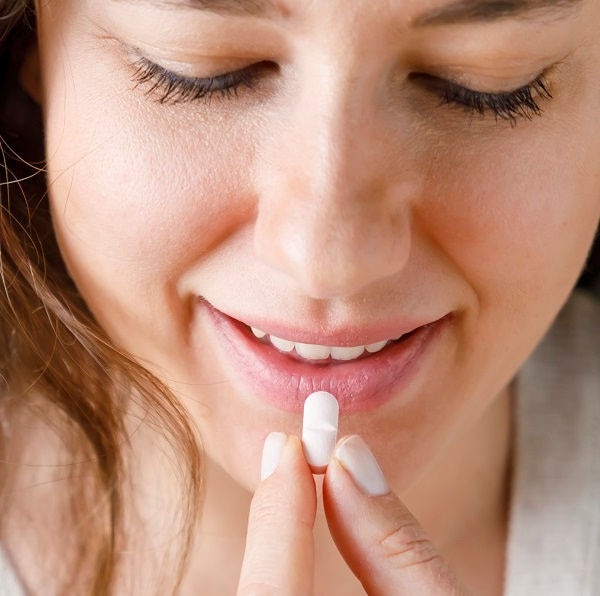News
August 31, 2022
What is calcifediol and how is it supporting innovation in the vitamin D space?
It’s well-known that vitamin D plays an important role in immune function – where it supports the effectiveness of immune cells and the inflammatory response. But what are the latest scientific findings behind the ‘sunshine’ vitamin’s role in immunity and how can dietary supplement manufacturers take innovation to the next level with calcifediol, the bioavailable form of vitamin D?

Summary
- It’s well-known that vitamin D plays an important role in immune function – where it supports the effectiveness of immune cells and the inflammatory response.
- But what are the latest scientific findings behind the ‘sunshine’ vitamin’s role in immunity and how can dietary supplement manufacturers take innovation to the next level with calcifediol, the bioavailable form of vitamin D?
- Get an expert perspective from Jim Richards, VP and Science Translation & Advocacy Segment Head, dsm-firmenich, in our latest Ask-the-Expert blog.
Ask-the-expert interview
Watch this exclusive interview with Jim Richards, VP and Science Translation & Advocacy Segment Head at dsm-firmenich, to explore the latest science-based benefits of vitamin D for immunity and how new ingredients – like calcifediol – are supporting innovation in the vitamin D market.
An effective, fully functioning immune system is essential to help protect the body against infection and disease. Many vitamins and trace minerals are crucial to building a strong immune system and are required for immune cells to function optimally. Vitamin D, especially, has been in the spotlight since the emergence of the COVID-19 pandemic and is well-known to have important benefits for immunity.1 To recap what we know about vitamin D and immune health so far:
- Vitamin D profoundly impacts the effectiveness of immune cells and the inflammatory response, which are both critical in resolving infections.2,3,4,5
- The role of vitamin D in immunity is regulated by the availability of 25(OH)D – also known as calcifediol or calcidiol - in the bloodstream (i.e. the active form of vitamin D in the body), which is further converted to 1,25-dihydroxyvitamin D and utilized by immune cells. When 25(OH)D levels in the blood are insufficient or deficient, immune responses can be limited, leading to increased risk of infection incidence and severity.6
- Individuals who supplement their diet with vitamin D have a significantly reduced incidence of respiratory tract infections, with some indication that the greatest positive effects of supplementation may be seen in individuals with the lowest 25(OH)D levels.7,8,9
What about vitamin D and COVID-19?
The COVID-19 pandemic has transformed consumer attitudes towards health and immunity, with many people now taking a more preventative approach to their health as a way of protecting themselves against disease and infection. To understand consumers’ perceptions and attitudes towards immune health and nutrition, dsm-firmenich conducted a worldwide Global Health Concerns survey in 2021 – interviewing almost 19,000 people across 24 countries.10 It found that 60% of consumers are concerned about their immune health and 65% are more conscious of their immunity following COVID-19. In order to support their immune health needs, people are increasingly making dietary choices – or choosing nutritional solutions – that bring a range of immunity benefits, like vitamin D products. But what is the latest science behind vitamin D and COVID-19?
In a study of more than 190,000 Americans, researchers found that reduced 25(OH)D status was strongly associated with increased risk of a positive COVID-19 PCR test.11 Individuals with deficient 25(OH)D levels had a 54% higher rate of a positive test than those who had adequate levels. Because vitamin D status was measured up to 12 months prior to testing, this suggests that low vitamin D status was a predictor of infection, rather than the result of it.
A 2021 meta-analysis of 54 observational clinical studies representing 1.4 million people provided further strong evidence that low 25(OH)D levels are associated with greater COVID-19 incidence, severity and mortality.12 The authors concluded that serum 25(OH)D levels ‘higher than 75 nmol/L would be required to minimize the clinical burden of SARS-CoV-2 infection’. Using public health records, a study including more than 108,000 people supplemented with vitamin D found that vitamin D intervention has the potential to improve the status of the nutrient in the body and reduce the risk and impact of COVID-19.13
These latest findings reinforce and expand on the science behind vitamin D to help inform and shape public health policies, as well as educate consumers about the benefits of the nutrient. Currently, Professor Philip Calder, Head of Human Development & Health and Professor of Nutritional Immunology within Medicine at the University of Southampton, advises 2,000 IU/day (50 µg/day) vitamin D in the general population (non-infants) to reach a vitamin D status in the blood that is sufficient (≥75 nmol/L) and will help to support immunity.2
Discover calcifediol for next generation vitamin D products
Despite its clear benefits, vitamin D insufficiency and deficiency remain highly prevalent worldwide. With the benefits of vitamin D for immunity front of mind following the pandemic, this has led to the development and launch of vitamin D-based nutritional solutions to the market. However, many manufacturers are wondering what’s next when it comes to innovation in the vitamin D space. Most vitamin D products can take months to take effect. Because of this, alternative ingredients and solutions that help to increase vitamin D concentrations more quickly are being explored – like calcifediol.
Calcifediol – also known as calcidiol or 25(OH)D – is the most common form of vitamin D in the human body. It is also the more bioavailable form, allowing it to be better absorbed. This helps elevate optimal vitamin D levels faster – in just a matter of days and weeks – to unlock the benefits of the ‘sunshine vitamin’ more rapidly than vitamin D3.14,15,16 Supplementation with calcifediol therefore represents a safe and effective strategy to reverse vitamin D insufficiency or deficiency faster and more effectively than vitamin D3, supporting immune function and reducing the risk and impact of respiratory tract diseases, like COVID-19.
Learn more
Want to know more about the science behind vitamin D, the benefits of calcifediol and how dsm-firmenich is helping customers innovate with the ingredient? Download our new vitamin D and immunity whitepaper to find out.
References
- Aranow. Vitamin D and the immune system. J Investig Med., vol. 59, pg. 881-886, 2011.
- Calder et al. Optimal nutritional status for a well-functioning immune system is an important factor to protect against viral infections. Nutrients, vol. 12, pg. 1181, 2020.
- Gombart et al. A review of micronutrients and immune system-working in harmony to reduce the risk of infection. Nutrients, vol. 12, 2020.
- Calder. Nutrition, immunity and COVID-19. BMJNPH, vol. 3, pg. 74-92, 2020.
- Charoenngam & Holick. Immunologic effects of vitamin D on human health and disease. Nutrients, vol. 12, pg. 2097, 2020.
- Bilezikian et al. Mechanisms in endocrinology: vitamin D and COVID-19. European Journal of Endocrinology, vol. 183, pg. R133-R147, 2020.
- Martineau et al. Vitamin D supplementation to prevent acute respiratory tract infections: systematic review and meta-analysis of individual participant data. BMJ, vol. 356, 2017.
- Bergman et al. Vitamin D and respiratory tract infections: a systematic review and meta-analysis of randomized controlled trials. PLoS ONE, vol. 4, e65835, 2013.
- Jolliffe et al. Vitamin D supplementation to prevent acute respiratory infections: a systematic review and meta-analysis of aggregate data from randomized controlled trials. The Lancet Diabetes & Endocrinology, vol. 9, pg. 276-292, 2021.
- dsm-firmenich Global Health Concerns Survey, 2021.
- Kaufman et al. SARS-CoV-2 positivity rates associated with circulating 25-Hydroxyvitamin D Levels. PLoS ONE, vol. 15, e0239252, 2020.
- Chiodini et al. Vitamin D status and SARS-CoV-2 infection and COVID-19 clinical outcomes. Front. Public Health, vol. 9, pg. 736665, 2021.
- Oristrell et al. Vitamin D supplementation and COVID-19 risk: a population-based, cohort study. J Endocrinol Invest, vol. 45, pg. 167-179, 2022.
- Graeff-Armas et al. Supplemental 25-Hydroxycholecalciferol Is More Effective than Cholecalciferol in Raising Serum 25-Hydroxyvitamin D Concentrations in Older Adults. The Journal of Nutrition. 2020.
- Quesada-Gomez, J.M.; Bouillon, R. Is calcifediol better than cholecalciferol for vitamin D supplementation? Osteoporos Int 2018.
- Vaes, A.M.M.; Tieland, M.; de Regt, M.F.; Wittwer, J.; van Loon, L.J.C.; de Groot, L. Dose-response effects of supplementation with calcifediol on serum 25-hydroxyvitamin D status and its metabolites: A randomized controlled trial in older adults. Clin Nutr 2018.
Related Content
Recommended Reading
-

2 April 2025
The gut microbiome as a pathway to supporting children with autism: New study reveals synbiotics' dual benefits for digestive and behavioral symptoms
-

21 February 2025
New CBD bioavailability study with CBtru®
-

12 February 2025
Unlock mineral bioavailability: How phytase breaks through absorption barriers
Quick links
Customized blends of functional ingredients in one single, efficient premix.
Streamline your product development process and get to market faster.
From trade shows to conferences and other industry events, find out where you can meet us next.
Talking Nutrition, Health & Care
Explore new science, consumer insights, industry news and more in our latest articles.
Discover educational whitepapers, webinars, publications and technical information.
Request samples, place orders and view product documentation.
